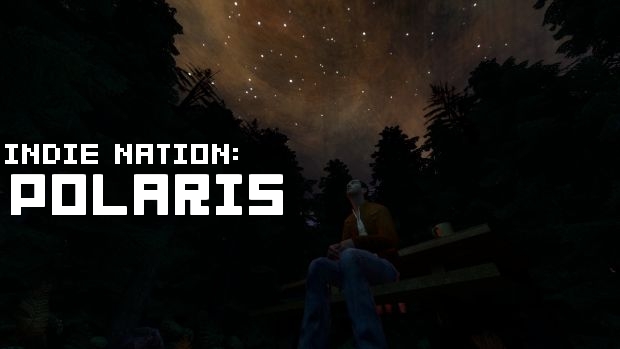Half-Life 2‘s Source engine may well be one of the most reliably satisfying pieces of technology in the modern gaming world. It gave us gravity guns, zombie hordes, portal physics — and now, of all things, a stargazing simulator.
Polaris, the first episode of what will ostensibly be a series of Source-based artgames, is unlike anything I’ve ever seen done with Valve’s little engine that could. In it, you play an unnamed man or woman on what the liner notes describe as “what could totally be both the lamest and the cheapest date ever.” To wit, stargazing.
The thing about Polaris is that after initially finishing it, I knew — knew — that I wouldn’t highlight it for an Indie Nation. The whole concept was interesting, yes, but it somehow felt weirdly unsatisfying. Something about how the too-loud musical chime that plays whenever you successfully spot a constellation clashes with the otherwise contemplative mood of the game, or how the gameplay really just boils down to clicking a bunch of hidden hotspots.
And yet, it began to gnaw at me. Despite initially passing it off as a tonally confused experiment, I found myself continuing to think about it days after I’d completed it.
Get the game here, or hit the jump as I try to verbalize how I feel about the game. Or, do both.
My first time through Polaris, my main takeaway could be summarized as follows:
– “Well, that was a humdrum ending”
– “At least I know how to find the North Star now, as immensely disconnected as that felt from the whole concept of going on a date”
And I felt this reflected poorly on the game. Games, especially artgames, should result in profound, obvious, “wow” moments like those found in Passage, Blueberry Gardens or Braid, right?
It wasn’t until a week later that I thought — well, not really. Not if your game is supposed to be humdrum, yet weirdly informative.
Polaris, to me, is a game about how even those seemingly forgettable or unenjoyable moments of our life still have something to teach us (in this case, quite literally). There is no emotional payoff to the protagonist’s date with Dylan, just as there is no satisfying climax to the game itself. After spending a seemingly endless amount of time clicking on constellations Dylan has instructed you to identify, he suddenly disappears. You use the skills he’s taught you to find him in a clearing, as emotionally distant as ever, and the narration informs you that a few days later you break up and never speak again. It’s a shrug-inducing denouement; I went through a dozen bizarrely classroomlike star-clicking tests for that?
And yet, I still learned how to find the North Star.
I initially found the obnoxiously dispassionate text narration irritating, until I realized I’d effectively been tricked into feeling the exact same things as the game’s wordy protagonist. Granted, maybe I didn’t have forgettable sex with Dylan, but I initially felt the entire date to be an irritating waste of time.
Except, I now know how to find the North Star.
I wouldn’t suggest everything the game does is borne out of some brilliant, seemingly counterintuitive intent — again, the constant and abrasive chimes that echo through the night everytime you click on the correct star are almost ridiculously jarring — but I’ve never before played a game that both intentionally irritated me while subtly and intuitively teaching me useful real-world information. And once I realized I’d actually retained the knowledge Dylan so oddly forced into me, it changed the entire context of the date.
Was he really being cheap, or was he actually trying to take the protagonist on a truly meaningful date with long-lasting implications? Was he just trying to fake depth by teaching me stargazing while acting emotionally distant? Even if he was, should that diminish the fact that I actually took something truly useful away from the date? Given the protagonist’s last, unconvincing promise that he or she hasn’t thought about Dylan since their date, one can’t help but assume, at least after having had a good few days to think about it, that Polaris‘ dullness and frustration are a viable part of the experience.
The game evidently has a couple of endings, two of which make sense: you either pay attention to the stargazing lesson and follow Polaris to find Dylan, or you ignore all the stargazing bullshit and leave in a huff. There’s a third resolution which I’m sure nobody would have ever seen if the game’s creator hadn’t mentioned it; at any time, you can leave the date by walking into the woods and be rewarded with another bit of text explaining what happened next. Given how many players might likely get fed up with the game and just turn it off, the ending is a pretty cool idea. Unfortunately, however, players don’t tend to quit games by moving their avatars off what they believe to be the active playing field — they just go to the menu and select “quit.” If this third ending could have been bound to that action, as was the case in Jason Rohrer’s Immortality, I feel it could have been a much more viable conclusion.
In the end, Polaris does a great job of making the player think. Not in the intentionally vague, metaphor-heavy way that most artgames do, mind you. Polaris instead makes you feel a bunch of generally unpleasant emotions, but provides just enough reason for the thinking player to stop and reflect on what those emotions mean and, when all is said and done, what both you and the protagonist are left with after the date is over.
Get it here.


